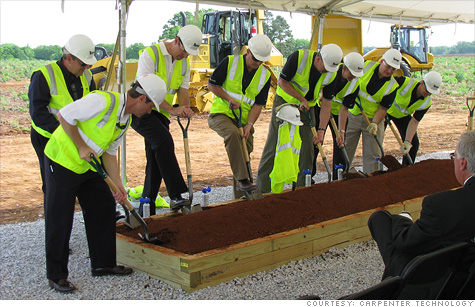Search News

Carpenter Technology broke ground this month on its $518 million plant in Alabama.
NEW YORK (CNNMoney) -- As manufacturing picks up across the United States, Alabama has become an unexpected beneficiary.
The state -- best known for agriculture and textiles production -- is enjoying the best pickup in industrial manufacturing in five years as U.S. and foreign companies flock there.
The credit goes to the state's low taxes, top-grade trade schools, a statute that curbs union power, and other incentives spurring many manufacturers to move to or expand in the state, experts said.
"2011 is the best year we've had in terms of manufacturing jobs and activity since 2007," said Greg Canfield, Alabama's secretary of commerce.
Companies that are set to open new plants in the state include German conglomerate ThyssenKrupp and a Chinese manufacturing giant, Golden Dragon Precise Copper of China.
Meanwhile Hyundai, Honda (HMC), Boeing (BA, Fortune 500) and truck manufacturer Navistar (NAV, Fortune 500) are expanding there.
One U.S. company that recently came to the state is Wyomissing, Pa.-based Carpenter Technology Corp. (CRS), which broke ground last week in the state's Limestone County to build a new 400,000-square-foot plant.
Carpenter Technology is one of 70 domestic manufacturers that announced plans last year to set up a factory in Alabama. They're expected to create 4,879 jobs and $1.6 billion in capital investment over the next two to three years.
In the same year, an additional 313 manufacturers, already in the state, announced expansion plans that would create another 12,369 new jobs and pour $2.5 billion in capital investment.
"In [the previous] five years, the percentage of our workforce in manufacturing has jumped to 12% from 5%," said Canfield.
State officials are pleased with the increased activity, but are looking to raise Alabama's profile even more as a top-notch destination for industrial and high-tech manufacturing.
In January, they unveiled "Accelerate Alabama," a plan to aggressively court manufacturers in 11 business sectors over the next five years. The 11 sectors include automotive, aerospace agricultural products, information technology and bioscience.
"We're focusing on where we expect manufacturing to thrive in the future," said Steve Sewel, executive vice president of the Economic Development Partnership of Alabama.
The program highlights the benefits manufacturers can get by bringing their business there. One advantage is Alabama's right-to-work statute, which puts a damper on union activity.
The law says workers can't be forced to join, or abstain from joining, a union as a condition of employment. "Manufacturers are more at ease making large investments knowing this fact," said Canfield.
Other advantages include relatively low labor wages and living costs, as well as state incentives that include free workers' training and recruiting programs.
State officials are also going so far as to pitch company executives with Alabama's world class golf courses, hotel resorts, bass fishing and hunting trails.
"Whether it's our golf courses or bass trails, which are very popular with Japanese executives, or NASCAR, [these intangibles] give Alabama a leg up on the competition," said Canfield.
The state developed its famous Robert Trent Jones golf trail in the 1980s with the specific intention of drawing company executives to the state.
Raymond Cheng, whose company SoZo was hired by Golden Dragon Precise Copper of China to scout U.S. locations in 2011, said: "It was also important for our clients to choose a place with a good quality of life for executives and staff," he said.
Alabama has a lot going for it, such as its golf courses, but Chinese restaurants are few and far between, he quipped.
Meanwhile, Carpenter Technology's $518 million plant is scheduled for completion by 2014. It will produce about 27,000 tons of premium alloy products for the aerospace and energy industries annually, said Bernie Mara, the company's vice president of global advanced engineering.
The company chose Alabama out of 250 worldwide locations, said Mara.
"At the end of the day, the incentive package that Alabama offered us, in terms of tax abatements, labor training programs and infrastructure grants were very compelling," he said. ![]()